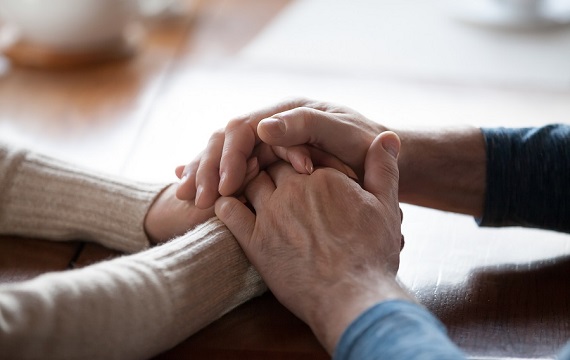Christmas can be a poignant reminder of the loved ones who are no longer with us. The traditions we once shared, the joyful memories we created, and the societal pressure to join in the celebrations can make grief feel even more intense. Family gatherings, festive songs, and even the sight of holiday decorations may bring an overwhelming sense of loss, and it’s normal to feel out of sync with the surrounding cheer.
The festive season also comes with the expectation of happiness, which can feel impossible to meet when you're grieving. You may find it difficult to participate in celebrations, and the pressure to be “merry” can weigh heavily on your heart. Understanding that these feelings are valid is an important step in learning how to cope with grief at Christmas.
At Distinct Cremations, we understand that grieving is not a linear process, and everyone experiences it slightly differently. We’ve put together some suggestions to help you, or someone close to you, cope with grief with Christmas.
It’s essential to give yourself permission to feel whatever emotions arise. Whether it's sadness, loneliness, or even guilt for not feeling festive, allow yourself to experience them without judgement.
Don’t feel pressured to be the life of the party, or to simply put on a brave face, as suppressing emotions can make them harder to manage, both in the short and long term. Accepting that it’s okay to grieve, even during a season of celebration, can help you process your loss in a healthier way.
While Christmas traditions may feel painful without your loved one, you can find ways to honour their memory by adjusting these rituals slightly.
For example, you might light a candle in their memory, place a special ornament on the tree, or set aside time to reflect on the moments you shared. These small acts can bring comfort, allowing you to celebrate Christmas in a way that acknowledges your grief and keeps your loved one’s memory alive.
Grief is deeply personal, and no two people experience it in the same way. Even within the same family or friend group, each person may cope with loss differently.
Some may find comfort in maintaining traditions, while others may prefer to create new ones. Open communication can help you respect each other’s grieving processes and to find a balance that works for all parties. Let your loved ones know how you're feeling and encourage them to share their emotions as well.
Sometimes, the most healing thing you can do is to speak openly about the person who has passed, even if the very thought of doing so is painful. Sharing stories, memories, and even the emotions you’re experiencing can help keep their memory alive. You might find comfort in reminiscing with friends and family, allowing you to feel connected to both your loved one and those around you.
Self-care is crucial during the emotional strain of the festive period. Grief can be exhausting, and taking care of your physical and mental health can help you navigate it.
Simple acts such as getting enough sleep, eating well, and taking time for yourself—whether through a walk in nature, a relaxing bath, or even reading a book—can make a significant difference in how you cope with grief at Christmas.
When everything around you feels chaotic, maintaining a routine can offer a sense of stability and comfort. Sticking to familiar patterns, such as meal times, bedtimes, or daily activities, can provide a grounding sense of normalcy, helping to keep you steady when emotions run high.
If someone close to you is grieving during Christmas, here are a few ways to offer your support:


For some, Christmas may bring anticipatory grief, especially if a loved one is terminally ill, or if the holiday season reminds them of their own mortality.
Planning ahead can bring a sense of peace and reassurance. Whether it's preparing for a future funeral or making funeral arrangements for your loved one, having these plans in place can ease some of the emotional burden, allowing you to focus on cherishing the moments you have.
If you're thinking about planning ahead, our friendly team here at Distinct Cremations are available to talk through your options, provide information and support, and help you choose a funeral plan.
Grief can feel isolating, but you don’t have to go through it alone. There are many mental health and bereavement services available to help you cope with your loss, especially during the Christmas period.
Here are some bereavement services and counselling options available across the UK:
And remember to always reach out to friends, family, or professionals for support when you need it.
For more guidance on navigating grief, take a look at some of these helpful articles:

Knowing a loved one is close to the end can be the most devastatingly disorientating time of our lives. In this guide, we'll look at managing anticipatory grief, how thinking about funeral plans can help, and much more about how to manage grief.
How to manage anticipatory grief
Grief is a very personal thing – perhaps one of the most personal things we’ll experience. When you, or someone you know, lose a loved one, you grieve in your own way. What’s important to remember is that there’s no right or wrong way to grieve.
The five stages of grief
There is no experience like preparing for the death of a loved one, but it's an experience most of us will go through in our lives. Though it's a time of sorrow and sadness, there are things you can do to make things that little more comfortable.
Preparing for the death of a loved oneWe offer the highest level of support, but don't just take our word for it. Below are recent reviews from customers who bought a funeral with us.





